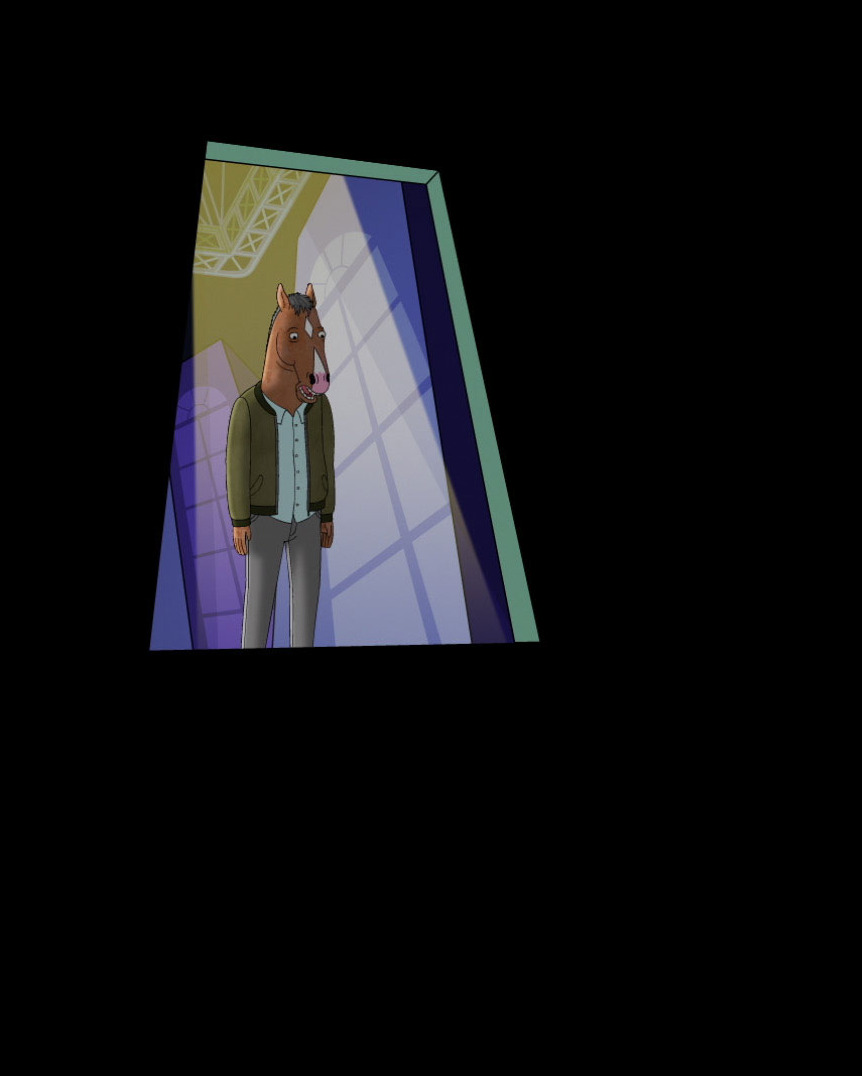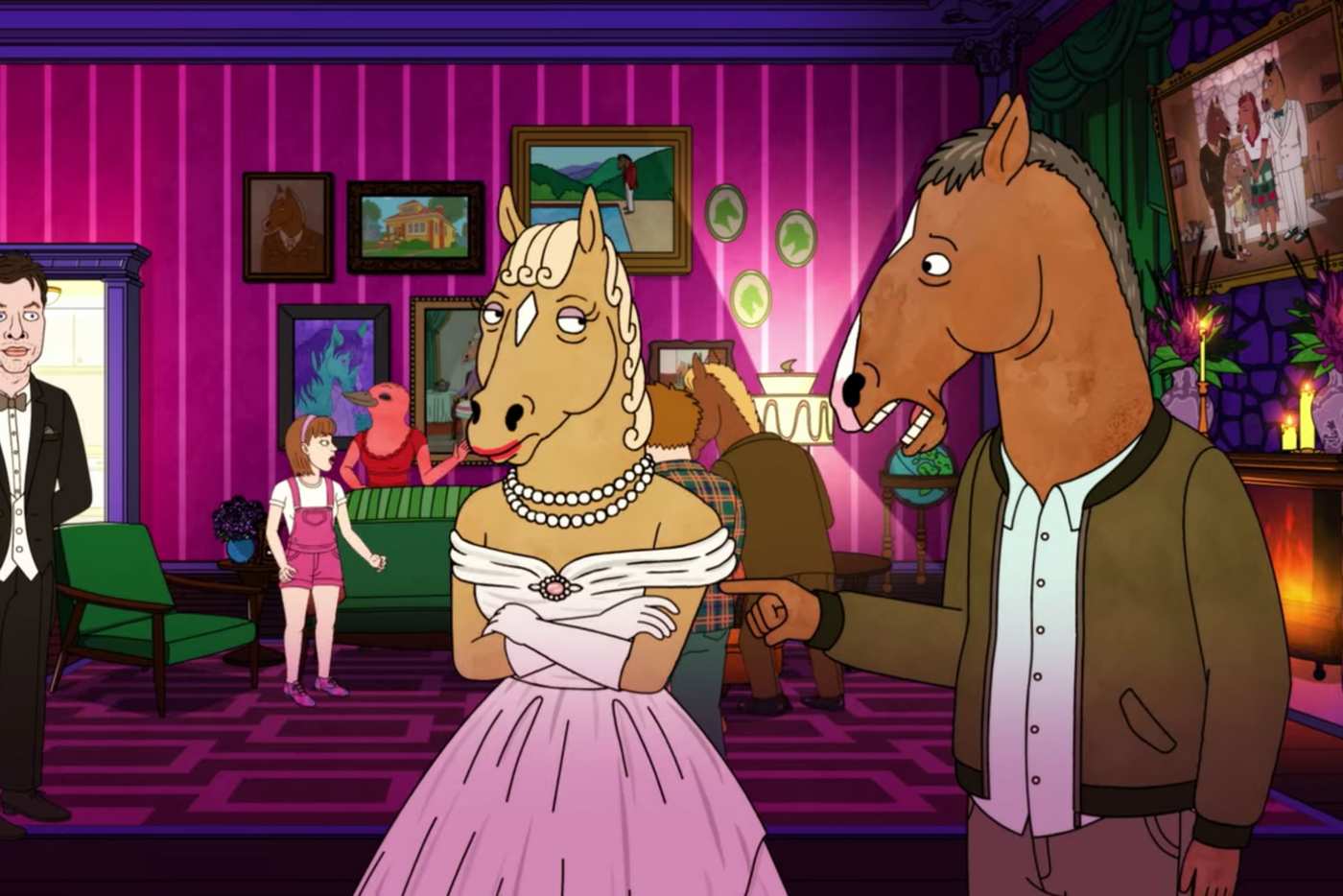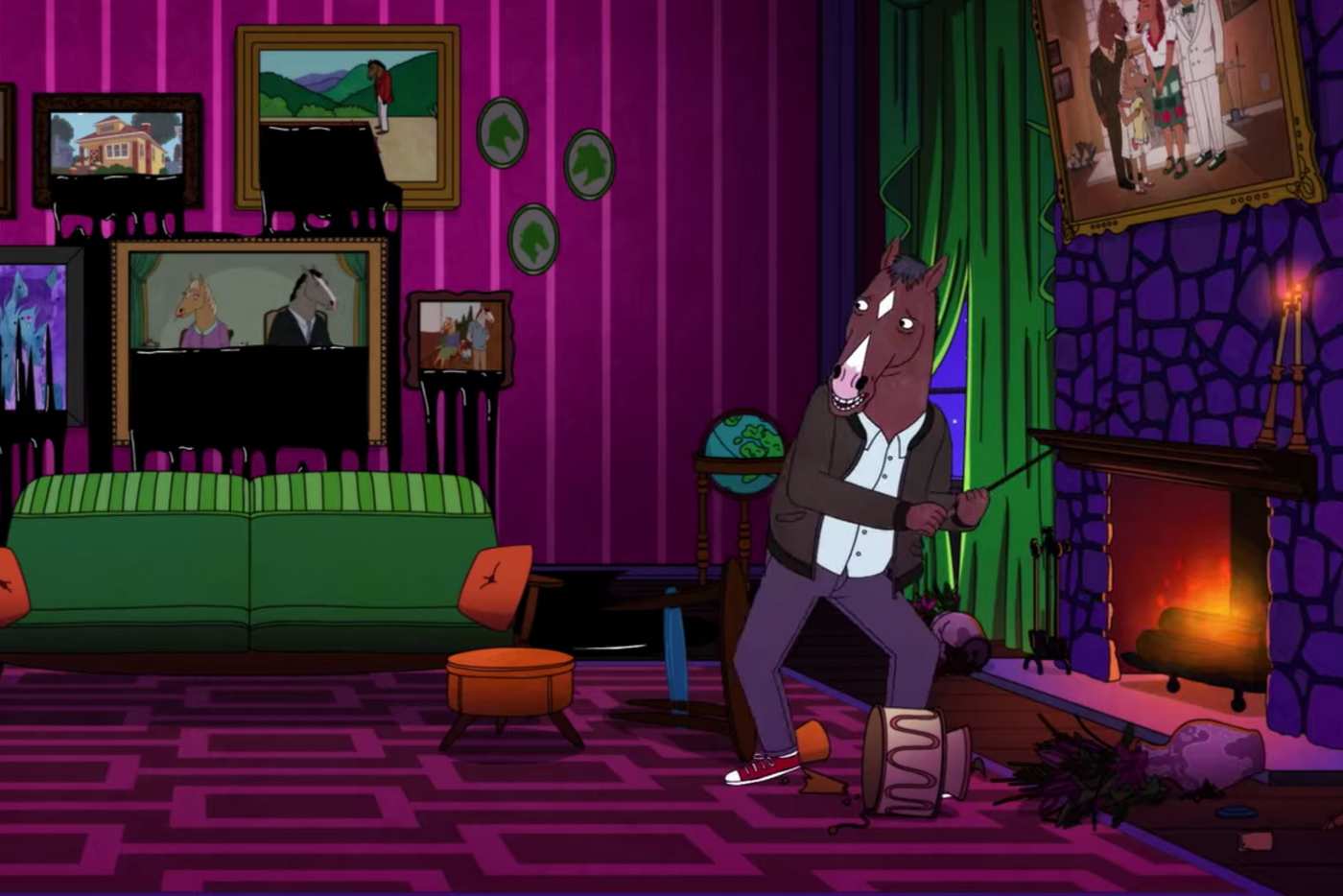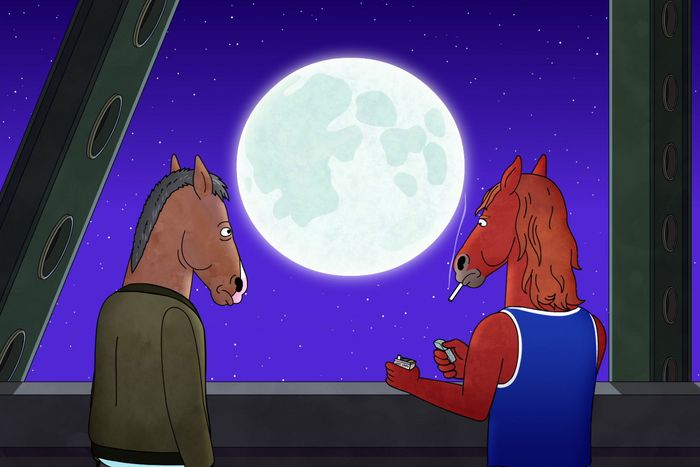
An Oral History of How BoJack Horseman Almost Killed BoJack Horseman
The show’s creators on making a trippy, death-obsessed penultimate episode.
by Jen ChaneyThroughout its six-season run, BoJack Horseman has regularly delivered stand-out experimental episodes. But in its final, eight-episode stretch, the Netflix show raises the bar with its penultimate installment, “The View From Halfway Down,” an odd dinner party that takes place inside BoJack’s addled brain after he overdoses on a potentially lethal combination of alcohol and drugs. (In case it wasn’t clear already, this article is going to spoil the hell out of this episode.)
“The View From Halfway Down” represents the major traumatic events that have weighed most heavily on BoJack’s psyche. It also represents all levels of the show’s production — writing, animation, direction, acting — working at their highest, most inventive levels. Together, the BoJack team created a half-hour of darkly comedic television that not only takes the show’s protagonist to the edge of death but shows us what it might look like, in its all confusing, scary, surreality, when a brain is close to shutting down for good. In short: BoJack confronts death in “The View From Halfway Down.” but by extension, so do we, which is something that TV comedies rarely force their audience to do. Here’s how it all came together.
Raphael Bob-Waksberg, series creator: Before we even knew this was going to be our last season, I had wanted to do a dinner party dream episode with all the characters who had died. I didn’t quite know what I wanted to do with it or what it was building toward or if BoJack would glean something from this dream or what it meant, but I just thought that would be a cool way to make an episode.
Alison Tafel, episode writer: The “dinner party with everyone who had gone” concept was always on a notecard floating around on the whiteboard. And then it was like, “This is the end, so … ” [Laughs]
Will Arnett, voice of BoJack Horseman: As we started getting closer to the end, there was an ongoing conversation about, “Now what? What’s going to happen to BoJack now?” Part of me didn’t want to know, and so I would ask very vague questions in the hope of getting a very vague answer.
Bob-Waksberg: In concept form, we didn’t quite know what it was. The original idea was that it was just going to be one long conversation with six people. And then, as we were talking about the structure of the season, it felt like, “Oh, this could be really cool if it was the penultimate episode and it was about BoJack’s own mortality.” I wanted to write the finale, so I knew someone else was gonna write it, but I did wait a long time. It really was like, “Oh, I’ve gotta pick someone. Alison will do it!”
Tafel: Raphael gave me two plays to give me the feel of what he was thinking about: Top Girls and Three Tall Women. Top Girls is just a bunch of historical women, dead women, talking to each other. Three Tall Women is all just talking.
Bob-Waksberg: I think my dream has always been to be a theater professor. I just slowly bent this show toward me being play professor and assigning people plays to read and talking about theater. I just gradually turned my television show into people in rooms having conversations.
The surreal gathering in “The View From Halfway Down” allows BoJack to reunite with his deceased friends and family for a macabre meal. Those present, in addition to BoJack: His mother Beatrice; former Horsin’ Around creator Herb Kazzazz; his Horsin’ Around co-star Sarah Lynn, whose death by overdose was a crushing blow to BoJack; Corduroy Jackson Jackson, his co-star in the film Secretariat, who died in season three via auto-erotic asphyxiation; and Zach Braff, who was killed in season four when Jessica Biel set him on fire (and in this episode is serving as a butler, for some reason). Putting all those characters in one room, where they’d sit down, talk, and not move around much, was a big visual challenge.
Bob-Waksberg: Zach Braff was real confused. He came in and he’s like, “I’m dead, right? What’s happening? I thought I died on this show, but you want me back? Great!” He was delightful and thrilled to be there and so funny. “Why am I a butler?” I don’t know, because it’s a dream! “Is it a dream, or is it purgatory?” It doesn’t matter. You’re a butler and you’re on roller skates.
Mike Hollingsworth, supervising director: A still episode where everything takes place in a conversation, it’s something [Raphael]’s been really interested in for a long time. That was actually the crux behind another episode, the one where [BoJack]’s giving the eulogy. He initially wanted that one, too, to be one blocked shot the whole time. In both cases, we decided that that might be a little too boring for a cartoon.
Amy Winfrey, episode director: The dining room scene was so technically difficult that that ended up picking up a lot of resources. I assigned a different storyboard artist to every character because it was just such a long conversation. My assistant director, Chris Nance, did BoJack through that entire scene. BoJack’s the hardest because he had so much to do.
Hollingsworth: Even though the scenes at the table effectively are pretty still, they’re murderous to storyboard because of the duration and the amount of acting and the amount of people you have to keep alive. It’s a testament to Amy’s talent that a scene where a bunch of people are just sitting around and eating for about ten minutes doesn’t feel like that. It’s almost like an action scene.
Winfrey: I would not want to be a live-action director trying to figure out how to shoot a dining room scene. It’s chaos. Just that part would have been a difficult episode. But having a bunch of fancy stage productions on top of that, plus goo chasing after BoJack, definitely made it an extra-difficult one.
That “goo” is an oozing black substance that creeps into the episode, a hint that, in reality, a drunk and drugged-up BoJack is drowning in a pool. That black ooze imagery is among the many details in the episode that add a sense of foreboding, dread, and just straight-up weirdness, including meals that signify how each character died, elaborate theatrical performances, and a door that, once stepped through, sends them into a permanent abyss.
Bob-Waksberg: I don’t want to say it was planned from the beginning of the series, but certainly when we were thinking, “What is causing BoJack to go into this place?,” we knew that he was relapsing and drinking and doing drugs again. It felt like, “Oh yeah, he could just pass out on the couch … or it could be in the pool. Let’s go that way. That is much more resonant.” In the credits, but also throughout the series, there have been so many references to swimming and drowning. It felt like a nice pay-off.
Hollingsworth: This whole episode takes place probably over 30 seconds, as he’s drowning. In the dining room, the fireplace behind BoJack is glowing very brightly because he still has life in him. But that fireplace starts to dim. The fire is going out. It’s very subtle, but it was just a nice little touch.


Tafel: The first two acts, were a dinner party and it was very light, and then it gets scary. I pitched the idea of this doorway that opens into nothingness. Raphael said, “We should insert some jeopardy so it’s not just a surprise at the end.” So, from this blackness came this idea that there’s actually stuff coming out of that door. It starts out with these drips, and then it’s inside of [BoJack]. He’s coughing it up. I believe it was written like “drips of water and burning and blackness.”
Hollingsworth: We had our effects animator, Karl Pajak, develop how that black ooze moves. We really wanted it to have an uncanny valley chirpiness to play up the unsettling nature of its movement. It looks almost like some kind of octopus out of water.
Tafel: I pitched that everybody was changing at all times. I was like, “Now it’s older Beatrice, and now it’s older Herb, now it’s younger Herb. And sometimes it’s Secretariat and sometimes it’s Butterscotch.” I sent it to Raphael and he was just like, “Calm down, it’s too much going on.” [Laughs.] Of all the ones to be aging, Sarah Lynn felt the most fitting.
Bob-Waksberg: We were way over budget this year. We were constantly having to simplify and cut things down. Often that is really helpful because it forces you to focus. What is the story we’re telling? Are there interesting things that we can do with that? How does that affect our storytelling? But it’s also meant, well, we have all these designs of Sarah Lynn, so we might as well use them. For some of these other characters, we don’t have as many different looks, so we don’t want them changing as much. For Sarah Lynn, we have the opportunity to really show a trajectory.
Hollingsworth: In that main purple room, the paintings are changed in subtle ways. We have our Hockney that was always in BoJack’s office and instead of swimming, the horse is dead. He’s dead in the water.
Hollingsworth: This was not in the script, but Amy put it in. At that meal, everyone is eating something that is tied into their death.
Winfrey: There was some mention of a couple in the script, but other ones, I’m just like: “What would Cracker Jack be eating?” I thought a can of carrots would be fun, like rations.
Another odd touch: When BoJack’s father Butterscotch finally arrives, he takes on the appearance of BoJack’s personal hero Secretariat. In the middle of a variety show emceed by Herb Kazzaz, BoJack and his dad (both voiced by Arnett) slip outside to have a smoke. They step onto a bridge — an allusion to the Louisville bridge where Secretariat leapt to his death in the show’s first season — and Butterscotch/Secretariat tells BoJack how much he cared about him. When they go back inside, BoJack’s father reads an original poem, “The View From Halfway Down,” before plunging through that door to nowhere.
Tafel: Everything is off in this episode, but the moment when [BoJack] says, “Hi, dad,” and it’s Secretariat, that was this big reveal. You’re thinking you’re going to see his dad and instead it’s a person that he’s idolized. That was Raphael’s idea.
Bob-Waksberg: I wanted things to feel not quite real. It’s not like BoJack is in purgatory with these people. We wanted it to be loose and dream-logic-y. BoJack’s father would be Secretariat, but he wouldn’t really comment on it. BoJack’s not like, “Wait, you’re not my dad.”
Arnett: When they go out for a smoke, he’s slightly confused, of course, but this was a tough relationship. Even in his remembrance — even in this fever dream, if you will — he is hoping to get some relief. I’ve always thought of Butterscotch as someone who gave up before he even started. BoJack is a far more evolved human being than Butterscotch, which doesn’t say a lot for Butterscotch. He’s a much harder person.

Tafel: I was really proud of the scene of Butterscotch/Secretariat talking to BoJack. Just him saying something to his son that he always wanted to hear. But did he ever really feel that way? So there is a blurriness there.
Bob-Waksberg: We wanted the lines to be super muddy.
Tafel: I was scared to write [Butterscotch’s] poem, and Raphael’s like, “You can’t just set up that there’s a poem and then not hear the poem.” To me, there was so much weight to it on many levels: “Is it a shitty poem? Is it a good poem? What if I try my best to write a good poem and then everyone on the writing team reads it and goes, What a funny, bad poem.” I was so scared of all of that, so I went home to my husband and was like, “I gotta write a poem.” That morning, while he was getting ready for work, my husband wrote me a little poem and he handed it to me. It was so sweet. I actually taped that poem to my computer screen so I could write the first draft. The cadence of his little love poem became the cadence in the original draft of the poem. So I always feel like, “Oh, what a love story about this suicide poem I wrote.”
Bob-Waksberg: We weren’t sure if we were going to get John Krasinski back to play Secretariat like he did in the first few seasons, so we said, “Let’s get Will doing it, too. Maybe, once we can get John Krasinski, we can do a thing where we’re switching back and forth.” And then, as Will did it, it felt like, “Oh no, that’s what we needed.” His performance was so brutal and gorgeous. This is really who we wanted to see BoJack have this conversation with, even though it looks like Secretariat. So I don’t even know if the offer ever went to John Krasinski. I hope he’s not mad. [Laughs.]
Tafel: Don’t get me wrong, I would love to meet Jim from The Office. But it was like, “Oh my gosh, that was incredible. Why would we try to top that?”
Arnett: I have been the beneficiary in this experience of so much wonderful writing. When it comes to recording and performing it, I always try to stay as sensitive as I can to the intent. If I can do that, it usually turns out okay.
When it’s finally BoJack’s turn to walk through the door, he panics and runs away. In the closing moments of the episode, the black ooze takes over the full frame as we hear the sound of a flatline. BoJack is dead … or so it seems until the beeps of his heart monitor suddenly return over the credits.
The series finale reveals that BoJack was saved by the tenants living in his former home, though afterward he’s arrested and sent to prison for breaking and entering. BoJack Horseman ends with its anti-hero alive, out of jail for one night only and having what’s most likely his final conversation with his friend Diane Nguyen. Their exchange summarizes the message of the show: “Life’s a bitch and then you die,” BoJack says, in effect the blunt takeaway from “The View From Halfway Down.” “Maybe,” replies Diane. “Or maybe life’s a bitch and then you keep on living.” That’s the note that still rings in the air when BoJack Horseman, the show, exhales for the last time.
Bob-Waksberg: The original idea was that he was going to wake up at the end of [“The View From Halfway Down”]. The more we got into it, the more I really felt like that breaks the integrity of the episode a little bit. It’s less a question of “Is it too bleak an ending?” and more “Is our audience going to feel like it’s a cop-out if he wakes up at the beginning of the next episode?”
Winfrey: For me, this is where the season ended because I literally went out the door before that last episode was done. So I was like, “Yep, he’s dead.”
Arnett: I was pretty sure that he wasn’t, but I wasn’t exactly sure how.
Tafel: I don’t even know if I would say, “I for sure think there’s nothing [after death],” but to me, that’s what’s scary. There’s the [Herb Kazzaz] line: “Oh, BoJack, no. There is no other side. This is it.” To me, more than whether or not that’s true or false, that is a very scary feeling. I remember arguing for a little bit of hope, and when I finally got to see the final product, I called Raphael immediately and I was like, “The credits! Thank you!” There’s the flatline, and then if you stay for a little bit longer, it starts beeping again.
Bob-Waksberg: I’ve been telling people, you gotta watch the credits! You’re gonna miss stuff.
Hollingsworth: We were working on these last two episodes at the same time. They were tied together, the dark and light. The final episode is certainly melancholy, but it is light compared to this dark. Episodes 15 and 16, in a way, are a little microcosm of the whole series. That’s this very dark thing and this very optimistic thing all tangled up together.
Bob-Waksberg: I felt like people would think, “Oh, they’re having their cake and eating it, too. They’re doing the episode where he dies, but then they’re also doing the episode where he doesn’t die.” But I think most people are going to watch these episodes back to back, so it’s not like there’s a whole week where you’re thinking, “Well, BoJack’s dead,” and then you’re back Thursday night at 8 o’clock and you turn on the TV and you’re like, “What, he’s not dead?” [Laughs.] That’s some real Nick Fury ass-shit.
Arnett: [Raphael and I] did have a conversation about what would be the most BoJack ending. I thought the way Raphael ended it was the most BoJack ending. There’s always a tendency to make the biggest, most salacious, over-the-top ending because of the idea of going out with a bang. What I love is that Raphael figured out an ending that really satisfied these complicated people in a way that might not be exactly what people expect. There will be unanswered questions and that’s okay. It’s like any lesson. At the end of it, what have you really learned? Hmm. I don’t know. I think I have more questions.